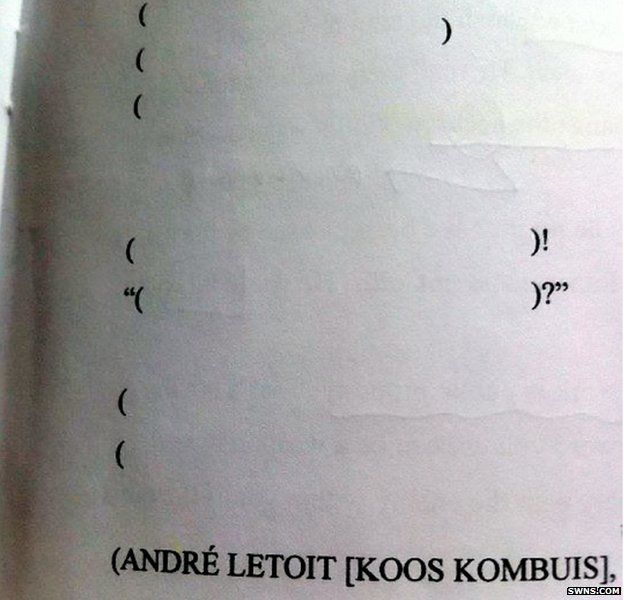How to read a poem consisting only of punctuation
- Published

Cambridge students were asked in an exam to write about a poem which included no words, just punctuation. How would you go about making sense of it, asks Jon Kelly.
Turn over your papers, please. There's a poem in front of you that is entirely free of poetry's key ingredient - words. Now you have to write something about it. Go.
That was the task facing Cambridge students who sat an English literature practical criticism paper, according to reports. The work they were confronted with was Tipp-Ex Sonate by the South African writer and musician Andre Letoit, who goes by the name Koos Kombuis. This piece includes only brackets, quotation marks, an exclamation mark and a question mark.
"I don't think you could write an interesting long answer about the text," says Mark Ford, a poet and professor of English Language and Literature at University College London. The pattern is not particularly complicated and there are only a handful of characters.
A better strategy would be to put Tipp-Ex Sonate in a wider aesthetic context. Students could discuss the avant-garde tradition of anti-art, widely associated with the dada movement, which saw defacing or destroying artworks as a form of iconoclasm. Students could mention Robert Rauschenberg's Erased de Kooning Drawing, external or John Cage's 4'33", external. Alternatively, a student could discuss the likes of ee cummings, Charles Olson and Ezra Pound, all of whom used typographic trickery in their poems. These kind of "typewriter high-jinks", sometimes known as concrete poetry, were a regular feature of the 20th Century avant garde, says Ford. Or they could refer to efforts to read computer code as a form of poetry., external
It's also possible to see it as a memorial to the millions who died as a result of the last century's wars and despotisms - "a commemoration of the disappeared and the inadequacy of language", suggests Ford.
In fact, according to Kombuis, a long-standing anti-apartheid activist, Tipp-Ex-Sonate was a protest against censorship laws imposed during white minority rule. "If you know about the historical and political context you could make sense of it as an inability to use a language that's tainted by apartheid," says Ford. But assuming undergraduates did not have access to an internet connection, it would be difficult for them to work out the poem's intended meaning, he adds.
Some students must surely have been tempted to hand back their exam papers adorned only with punctuation of their own.
Follow @BBCNewsMagazine, external on Twitter and on Facebook, external